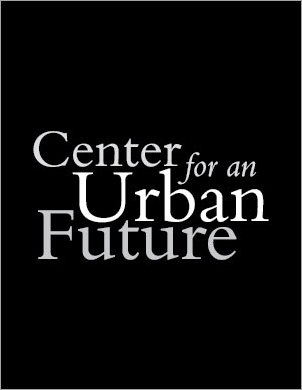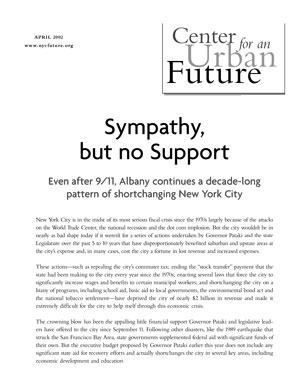Few people familiar with the goings-on in Albany expect too much from the lawmakers there. After all, the governor and the legislature have failed to pass a budget on time in 19 years, and refuse even to debate important statewide issues like campaign finance reform. But residents of New York City have a special right to be disappointed.
For the past several years, if not longer, Albany lawmakers simply have been indifferent, at best, to city interests. As I detail in "Sympathy But No Support", a report I wrote in April for the Center For An Urban Future, the city would not be in as bad fiscal shape if not for a series of actions undertaken by Governor George Pataki and the state legislature over the past five years that cost the city lost revenue, imposed new financial mandates on the city and disproportionately benefited upstate and suburban areas at the city's expense. Two years ago, for instance, the legislature and Governor Pataki eliminated the city's $400 million-a-year commuter tax primarily because Democratic and Republican legislative leaders each thought doing so would help their party's candidate win a special election in Rockland County. Last October, they ended a $114 million-a-year aid payment the state had made to the city for more than 20 years, even though it was obvious that the city would be facing a budget crisis. And the governor recently appealed a State Supreme Court decision finding that the state's school aid formula blatantly discriminates against the city's school children.
This year has been no different, despite the emergency conditions created by the terrorist attack on the World Trade Center -- a nearly unprecedented budget crisis, the loss of 100,000 jobs, the exodus of corporations, and a steep decline in tourism, one of the city's most reliable sources of revenue.
As the 2002 legislative session winds down to a close, the city will wind up, as usual, getting little from Albany.
What the City Did Get
The governor and legislature did manage to enact a handful of relatively minor revenue-raising measures that were requested by Mayor Michael Bloomberg to help the city balance its books. But most of the measures simply allow the city to raise its own revenue and most do not cost the state a dime.
Bowing to a request from Mayor Bloomberg, Albany gave the city the permission it needed to raise its cigarette tax from 8 cents to $1.50. Bloomberg initially estimated that this action would provide the city with about $240 million a year in new revenues, but Albany unexpectedly voted to give the state half of the new income.
State lawmakers also allowed the city to increase its debt limit, raise parking fines and impose a tax on cell phones. And it permitted to allow the city to continue to collect a particular business investment tax, even though the federal and state governments no longer collect it.
The Speaker of the Assembly, Sheldon Silver , gave the Bloomberg Administration its biggest victory to date when the Assembly reached an agreement with the State Senate and Governor Pataki to give the mayor control of the city's school system. New York City mayors had tried to wrest control from the Board of Education for more than a decade, but Albany's permission was needed and the Assembly usually blocked any effort to make the change.
The city also won a slightly larger share of state school aid in this years budget, receiving an increase of $163 million, 39 percent of the $420 million increase statewide. Speaker Silver later included another $37 million in school aid to help the city pay for new computers in its classrooms. In addition, the state will provide city schools with a one-time payment of $200 million, though this is simply a reimbursement of money the state owed the city for years.
In a response to the terrorist attack on the World Trade Center, the state agreed to create nine tax-free shopping days in lower Manhattan. It also provided tax breaks to families of those who died on September 11. This was on top of the $40 million the state allotted last year to promote tourism in the city and the downstate region.
Finally, the legislature restored cuts initially proposed by the governor for AIDS programs, and added $4.75 million for programs to fight AIDS in minority communities.
What Was Missing
The assortment of new fines, taxes and surcharges granted by Albany lawmakers will help the city raise an estimated $400 million a year in new revenue. The permission to raise the city's debt limit was crucial to the city's plan to borrow $1.5 billion as a way to help close this years budget gap. But all this amounts to little, given the magnitude of the problems facing the state's most important municipality -- the city that almost single-handedly drove the state's economy during the boom years of the 1990s.
In fact, the 2002 legislative session will probably be remembered most for what did not get accomplished.
1. No Commuter Tax
The biggest disappointment was the failure to restore the city's commuter tax on suburban residents who work in the city - or even to have a real debate over the issue. This was a relatively miniscule tax that was repealed in 1999 when the city's economy was on fire. At the time, then-Mayor Rudy Giuliani and countless budget watchdogs urged Albany legislators to vote against the repeal, warning that the city would sorely miss the roughly $400 million a year in revenue when the economy slowed down. The state's top lawmakers all said in effect that they would revisit the issue then. But then has become now, with the city facing a $5 billion budget gap that only gets larger in the years ahead. Yet Governor Pataki and Senate Majority Leader Joseph Bruno ruled out the possibility of reinstating the commuter tax. Assembly Speaker Silver initially floated the idea, but never made it a central part of his budget negotiation strategy. Several members of the Assembly from New York City sponsored legislation to reinstate the tax, but without support from Assembly leaders, it never got out of the Ways and Means Committee.
With sympathy for the city at an all-time high, this year may have been the ideal opportunity to reinstate the commuter tax. After all, the measure was designed to use the revenue from commuters to pay for city services that they use while working in the city - services like police and fire. But even Mayor Bloomberg failed to push for reinstatement, citing the difficulty of getting this done in an election year.
Bloomberg did ask state lawmakers to reinstate the $114 million-a-year stock transfer payment, which the state had been making to the city since the stock transfer tax was eliminated in the 1970s. Governor Pataki and the legislature had ended the payment in 2001, even though, at the time, it was already clear that the city would be hurt without it. Despite the mayors request, however, Albany never seriously considered re-establishing the payment.
2. No Tort Reform
State lawmakers also failed to enact, or even seriously consider, tort reform, another thing on Bloomberg's wish list. The mayor made a serious pitch for tort reform when he unveiled his budget earlier this year, saying it would save the city $100 million a year. But with legislators in both houses receiving substantial campaign contributions from trial lawyers, the issue never gained momentum.
3. No Fair Share In Economic Development Funds
With the city losing more than 130,000 jobs between December 2000 and March 2002, it would have made a lot of sense for state lawmakers to include the city in a significant portion of its new economic development initiatives. Though much of the economic development funds have not been allocated, it appears that, as in previous years, the city will get a disproportionately small share of them. The largest single economic development initiative in this years budget, the governors Centers of Excellence program, will provide $250 million to establish high-tech centers in Buffalo, Syracuse, Albany, Rochester and Long IslandÉbut not in New York City. Other new programs, like the $50 million Empire Opportunity Fund, are expected to exclude the city.
4. No Extension Of Unemployment Benefits
On a related matter, the State Senate has failed to act on an Assembly bill to extend unemployment benefits to those who are out of work because of September 11 for an additional 13 weeks. The bill, sponsored by Assemblymember Catherine Nolan, passed the Assembly in June, but a similar bill in the Senate (sponsored by Senator Guy Velella) has not gotten out of the rules committee.
Thus far, state lawmakers have also failed to reach agreement on measures that would:
5. reform the Rockefeller drug laws (legislation for doing so was introduced by Assemblymember Jeffrion Aubry and Senator Velmanette Montgomery),
6. replenish funds to clean up polluted sites on the state's Superfund list,
7. clear the way for development on brownfields, and
8. increase the states minimum wage.
9. No Pay Raise For Attorneys For The Poor.
And, once again, it appears that the state will fail to raise payments for the attorneys who are assigned to provide legal services to the indigent, an issue with particular resonance in the city. The fees going to these lawyers have been frozen since 1986, making New York last in the nation in the amount it pays assigned counsel. In late June, the Assembly passed a bill sponsored by Assemblymember Helene Weinstein, but the Senate has yet to act on the legislation.
10. No Adequate Response To 9/11
Finally, while Albany officials did provide for a few days of tax-free shopping in lower Manhattan, the state's response to 9/11 was woefully inadequate. From the beginning, the governor and the legislature essentially decided to let Washington pay the entire cost of the city's rebuilding effort. In contrast, following the 1989 earthquake that struck the San Francisco Bay Area, the nation's costliest natural disaster up to that point, California's Republican governor and Democratic legislature agreed to supplement federal disaster aid with $1 billion in state funds to support rebuilding efforts. State lawmakers also refused to consider any significant emergency aid package for the city, even though Governor Pataki and legislative leaders have provided emergency aid packages to a number of distressed cities, counties and school districts, including some whose problems resulted from financial mismanagement. Should not the city, whose fiscal woes largely stem from September 11, have qualified for similar support?
A Question of Priorities
Given its own fiscal problems -- the state had to close a $6 billion budget deficit - there is certainly a limit to what the state could have done for New York City.
Still, it is not as if Pataki and the legislature passed an austere budget this year. It increases spending by six percent, adds $700 million in tax cuts and includes hundreds of millions of dollars in discretionary funds for the governor and legislators to sprinkle around the state as they campaign for re-election. In addition, state lawmakers enacted the fiscally unsound Health Care Reform Act, a $3 billion initiative to provide raises to health care workers in the union led by influential labor leader Dennis Rivera.
The 2002 legislative session essentially came down to a question of priorities. And in an election year, New York City's unprecedented problems apparently were not as compelling as Albany lawmakers drive to be re-elected.



